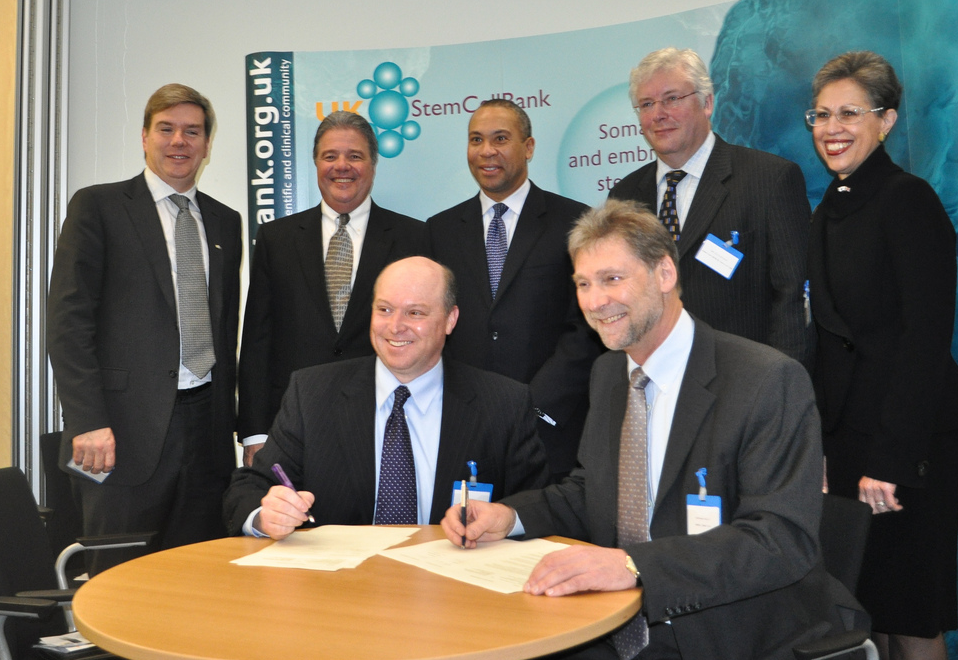
Governor Patrick and global stem cell leaders sign an agreement between UMass and the U.K. to share best practices for stem cell banking. Seated at left is Joseph C. Laning, PhD, senior director of the UMass Human Stem Cell Bank and Registry.
Photo credit: KimHaberlin/HED
As part of Gov. Deval Patrick’s Innovation Economy Partnership Mission 2011, global leaders in the field of stem cell banking and characterization—the University of Massachusetts Human Stem Cell Bank and Registry and the United Kingdom Stem Cell Bank—signed an agreement to share best practices for stem cell banking and to collaborate on standards for stem cell line characterization, production and distribution in the U.S. and U.K. The signing followed Gov. Patrick’s meeting with Glyn Stacey, director of the U.K. Stem Cell Bank, at the National Institute for Biological Standards and Control in Hertfordshire, England. The signing also follows on last week’s agreement between Massachusetts and Israel allowing for further collaboration in research and development programs between Massachusetts and Israeli companies.
“This agreement is an important step toward advancing groundbreaking scientific research, developing life-saving cures and building the life sciences economy of the future in both Massachusetts and the U.K.,” said Patrick. “Stem cell research has already led to exciting new developments in medicine and is at the forefront of 21st century medical exploration. We are excited to play a critical role in that progress.”
“This agreement represents a major step forward for the University of Massachusetts, for the University of Massachusetts Human Stem Cell Bank and Registry, and for researchers working in this critical field,” said UMass President-elect Robert J. Caret, who is a member of Gov. Patrick’s Massachusetts Innovation Economy Partnership Mission 2011 delegation.
“Stem cell research provides so much romise for scientists seeking to unlock new cures and new therapies for diseases that afflict so many people around the world. This is an important partnership for the University of Massachusetts and is a significant addition to our ever-expanding portfolio of global engagement,” President-elect Caret said.
The UMass Human Stem Cell Bank and Registry and the U.K. Stem Cell Bank support international research in regenerative and stem cell medicine by providing the biomedical research community with expertly derived and maintained human embryonic stem cell lines for fundamental biological investigation and therapeutic applications. Using stringent protocols, the banks provide high-quality, reliable stem cell lines to researchers working to discover new therapeutic treatments for diseases such as cancer, juvenile diabetes, Alzheimer’s and Parkinson’s, among others.
Today’s agreement calls for the two banks to identify shared priorities and create models that foster collaboration and cooperation. Potential areas of collaboration include the harmonization of standards for cell line characterization, production and distribution; identification of issues surrounding co-distribution of cell lines for research; and exploration of funding opportunities for joint research projects.
“Both banks share common goals and needs,” said Joseph C. Laning, PhD, senior director of the UMass Human Stem Cell Bank and Registry. “Working in concert allows us to develop strategies that will shape stem cell production, characterization, banking and distribution in a dynamic field. Each bank brings its own unique attributes to bear in a way that will enhance our influence in the field.”
Dr. Stephen Inglis, director of the U.K. Health Protection Agency’s National Institute for Biological Standards and Control (NIBSC) said, “This agreement presents an opportunity to forge a new strategic and innovative link between two leading international stem cell banks. International cooperation is vital in this fast moving field and we expect that the partnership will accelerate the development of important new therapies as well as keep the U.K. at the forefront of stem cell research.”
Stem cells are different from other cells because they not only have the ability to renew themselves for long periods but, with the right signals, can become many different types of cells. Because of these unique properties, scientists are able to use stem cells to learn what makes individual cell types unique, how an organism develops from a single cell to an adult and how healthy cells replace damaged cells in adult organisms.
The UMass Human Stem Cell Bank and Registry was developed in partnership with and backed by the Massachusetts Life Sciences Center, a quasi-public agency charged with implementing the state’s 10-year, $1 billion life sciences initiative. The UMass Bank works with other institutions and researchers to bank and characterize stem cell lines, detailing the cell line and its properties. After the lines are put through rigorous quality control testing by the bank’s experts, they are made available to researchers throughout the country and worldwide.
“Our vision was that the Massachusetts Stem Cell Bank and Registry would serve as a resource for researchers not just in Massachusetts, but throughout the world,” said Susan Windham-Bannister, president & CEO of the Massachusetts Life Sciences Center and member of the Innovation Economy Mission’s delegation. “With the signing of this agreement, that vision becomes a reality. We look forward to this collaboration, and to the benefits it will bring to the scientific community in Massachusetts, in the U.K. and across the globe. This partnership is a significant signal of Massachusetts’ commitment to meeting the evolving needs of researchers working in this vitally important field, as we endeavor to translate this research into commercialized products and therapies that will improve patient care and ultimately save lives.”
The UMass Human Stem Cell Bank and Registry were established in 2008 and occupy 15,000-square-feet of research and training space at the UMass Medical School’s Shrewsbury campus. The Life Sciences Center has provided $8.9 million in start-up funding for the organization.